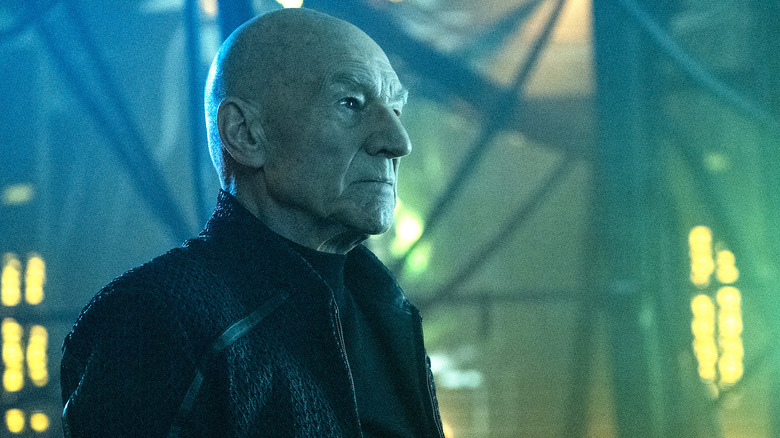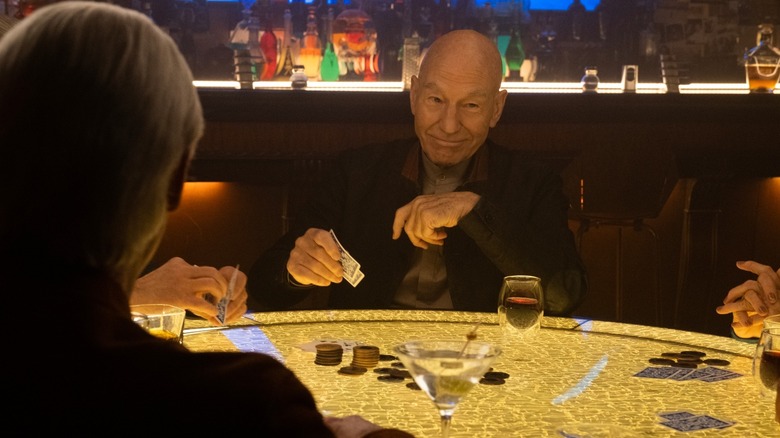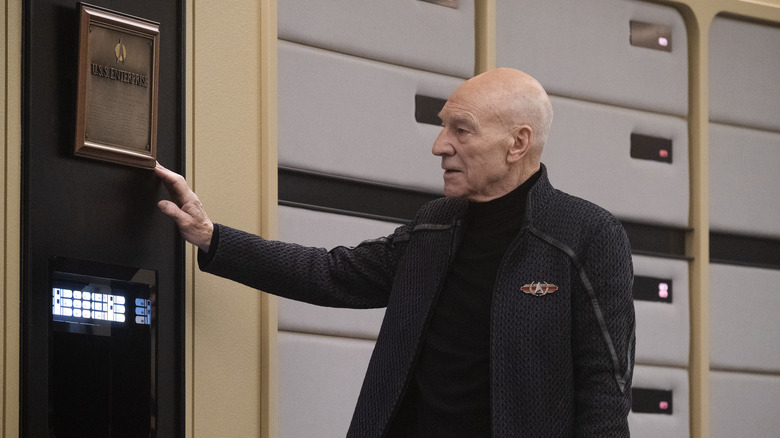Star Trek: Picard Gave Patrick Stewart Space To Experiment In Ways The Next Generation Never Did
This post contains spoilers for the last season of "Star Trek: Picard."
Those under a certain age should probably be reminded that seasons-long story arcs were once not the norm in broadcast television. Before viewers could marathon through entire seasons of TV thanks to DVD box sets (then, later, streaming services), they had to consume television shows on a weekly basis, careful to watch them as they were broadcasted. Because of this decades-long model, most series — daytime soap operas notwithstanding — were constructed on an episodic basis. A status quo was assumed, a drama would arise, and the conflicts would all be resolved by the end credits. Next week: a new tale.
While this model was a wonderful way to watch a lot of stories and to live with an established TV world for an extended period of time, there were perhaps some frustrations. For instance, a story could not be told that fundamentally altered the premise of the show. If a viewer missed such an episode in its initial run, they would be lost. The U.S.S. Enterprise on "Star Trek: The Next Generation," for instance, couldn't be destroyed. The setting had to stay consistent. Also, I'm sure the studio didn't want to build a new set to accommodate such a twist.
Additionally, a character would not be permitted to go through a massive change that would interrupt who they were from week to week. This might have been frustrating for actors who wanted to explore their roles more deeply. Captain Jean-Luc Picard (Patrick Stewart) had to remain Captain Jean-Luc Picard.
In a recent interview with the Los Angeles Times, Stewart, now the star of "Star Trek: Picard," admitted that the new series finally allowed for a new kind of character leeway. In the streaming era, the status quo is an incredibly low priority. Drama is far more important.
The lack of resolve
On "Star Trek: The Next Generation," of course, Captain Picard was always secure and confident, and led his crew with aplomb. He wasn't jovial, but he was open to hearing suggestions from his crew. Picard might serve as a role model on how to be a leader, how to manage a team, and how to keep one's cool in dire circumstances. What viewers rarely saw was a Picard that was at a complete loss for words, or a Jean-Luc who was so frightened by a certain crisis that he had no solutions. "Star Trek: Picard" takes place decades after the conclusion of "The Next Generation," and because of this, the character of Picard has grown and changed. By general calculations, Jean-Luc is about 105 years old in "Picard," and has become a different person.
Patrick Stewart was grateful for the change. In the LA Times interview, he revealed that he never had a chance to show his famous "Star Trek" character as possessing a lack of resolve. It was an acting challenge he appreciated. Stewart said:
"I looked forward to those scenes where Picard was not just anxious but actually frightened. Or confused. Or not knowing what to do. I got great satisfaction out of playing those things, because they allowed me to investigate, and release, aspects of Jean-Luc that had really never appeared in 'Next Generation.'"
In the final season of "Picard," Jean-Luc, no longer in command, was faced with a son he didn't know he had, a wicked villain who wanted to hijack his corpse (Picard became an android in the show's first season), and other various trials. It seems that, unlike on "Next Generation," Picard was decidedly out of his element. Seeing him frightened was appropriate.
The last 20 years
As previously covered in the pages of /Film, Patrick Stewart was contacted by "Star Trek" executive producer Alex Kurtzman in 2016 about the possibility of appearing as Jean-Luc Picard again after 14 years of "Trek" retirement. Not only had years passed for the actor, but even more time had passed in the mythology of the franchise. "Star Trek: Picard" would catch up with Jean-Luc after many years on his vineyards in France. He wasn't an adventurer nor was he an authority figure. It was up to Stewart to invent decades of backstory for his character. The actor said:
"I think it was Alex Kurtzman who said, 'Look, 20 years have passed, and in those 20 years, surely a lot has happened to you, Patrick. I know enough about your life to know there have been upheavals and changes. Surely, the same has happened to Jean-Luc Picard. What might those things be?'"
Stewart doesn't reveal the past that he wrote for Jean-Luc Picard, but does mention that he did indeed have one in his mind. More importantly, he wanted to create an inner emotional life for Picard that left the character feeling lonely and isolated. He made a Picard who "looks terrible. He's having such a bad time." Stewart was essentially permitted to re-invent the character from the ground up. After spending seven seasons with Picard on television and playing the role in four feature films, the "baseline" came easily. From there, Stewart could take Picard wherever he might want.
"Star Trek: Picard" has now ended, and the show's final scene was Stewart and his "Next Generation" cast mates playing poker. It seems that the character, having been afraid, is now comfortable again. Which is, by Stewart's estimation, a new chapter for Jean-Luc.


